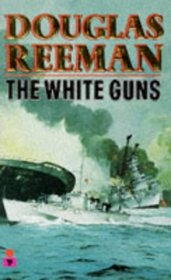I thoroughly enjoy naval fiction and have read most of the works of the major and many minor authors. And I have lost count of the number of Douglas Reeman's books I read and enjoyed.
In my opinion, "The White Guns" is the best yet of his novels. In many ways, it is easy to write of war. But is it easy for Freeman to do so, as he served during World War II in the British motor torpedo boats that are key to so many of his novels? Or are these novels his way of coping with his memories of the war?
It is harder to write of peace. When the guns are supposedly silent and the enemies are no longer evident. "The White Guns" begins on the last day of the war, as several small boats of the British Navy venture into Kiel, an important German U-Boat base. They are there to accept its surrender and to enforce the peace.
However, in "The White Guns," while the war is over, people still die. The enemies are just different. And, what is most disconcerting, some of your new allies were your old enemies. And some of your new enemies were your old friends.
In this novel, Freeman does an outstanding job of showing how men and women come to grips with the fact that life, as hard as it is, must go on. That it is possible to like, even love, those you once hated. And worse, to no longer trust some who stood by you during the war.
For those who wonder about the name of the book, as I did, I can only say that this most appropriate title will be revealed to you by the end of the novel.
As with many of Reeman's novels, for some of the characters there are happy endings. But for others... nothing could be worse than peace.
In my opinion, "The White Guns" is the best yet of his novels. In many ways, it is easy to write of war. But is it easy for Freeman to do so, as he served during World War II in the British motor torpedo boats that are key to so many of his novels? Or are these novels his way of coping with his memories of the war?
It is harder to write of peace. When the guns are supposedly silent and the enemies are no longer evident. "The White Guns" begins on the last day of the war, as several small boats of the British Navy venture into Kiel, an important German U-Boat base. They are there to accept its surrender and to enforce the peace.
However, in "The White Guns," while the war is over, people still die. The enemies are just different. And, what is most disconcerting, some of your new allies were your old enemies. And some of your new enemies were your old friends.
In this novel, Freeman does an outstanding job of showing how men and women come to grips with the fact that life, as hard as it is, must go on. That it is possible to like, even love, those you once hated. And worse, to no longer trust some who stood by you during the war.
For those who wonder about the name of the book, as I did, I can only say that this most appropriate title will be revealed to you by the end of the novel.
As with many of Reeman's novels, for some of the characters there are happy endings. But for others... nothing could be worse than peace.





